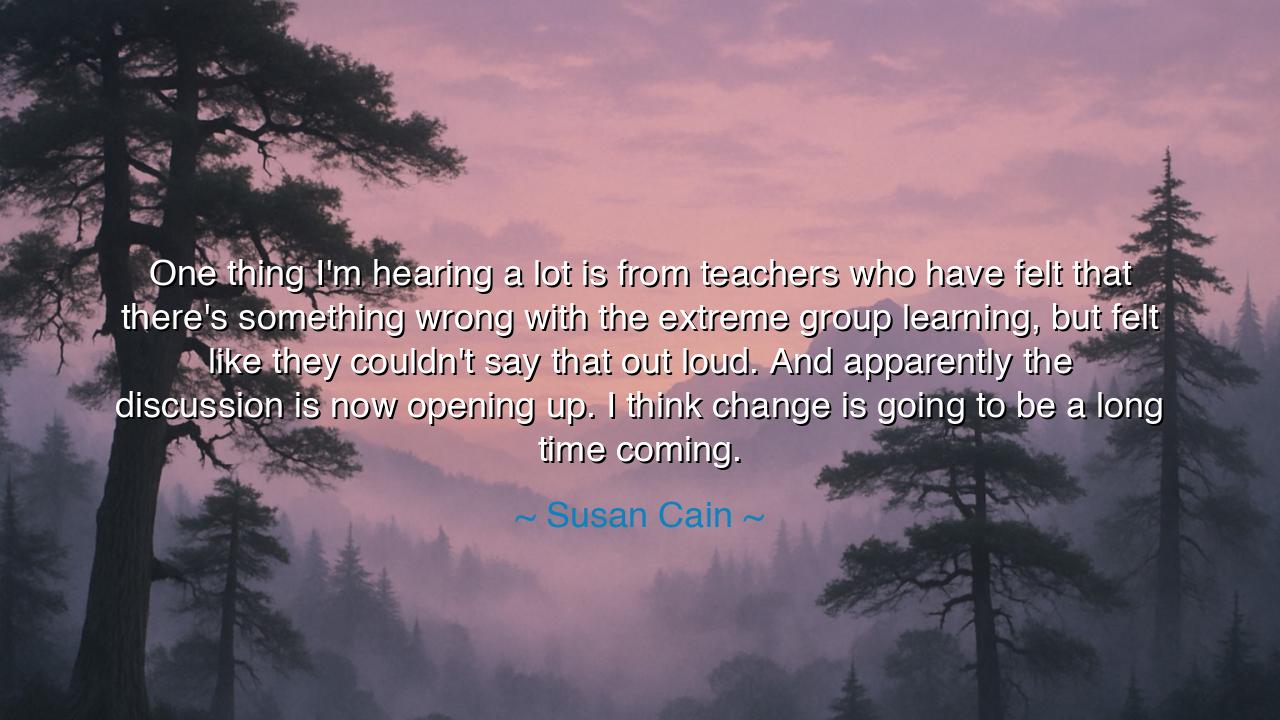
One thing I'm hearing a lot is from teachers who have felt that
One thing I'm hearing a lot is from teachers who have felt that there's something wrong with the extreme group learning, but felt like they couldn't say that out loud. And apparently the discussion is now opening up. I think change is going to be a long time coming.






In the councils of old, elders taught that every chorus begins with a single breath. Susan Cain’s witness—“teachers have felt there’s something wrong with the extreme group learning, but could not say it; now the discussion is opening, though change will be “a long time coming”**—names a tension as ancient as the classroom itself: the soul’s need for company and its equal need for quiet. She speaks for those who have watched the pendulum swing so far toward constant collaboration that the shy thought, the careful draft, the private wrestle with a hard idea have been pushed to the margins.
To question extreme group learning is not to scorn community; it is to remember that understanding ripens in more than one climate. Seeds need both sun and dark earth. So do minds. Some insights arrive in the clatter of debate, but others—often the most delicate—are hatched in silence and guarded by solitude until they are strong enough to fly. Cain’s words dignify the teacher who senses this and has long lacked permission to say it aloud.
Hear a story from a familiar school corridor. A literature teacher—let us call her Ms. Rivera—grew uneasy as every lesson turned into poster-making, stations, and constant talk. Bright students drifted to the edges; the slow-blooming ones withdrew entirely. One semester she restored twenty minutes of silent annotation and individual essay-crafting before any group exchange. What followed was not less collaboration but better collaboration: students carried formed ideas into the circle; the quiet had given them spine. The group gained richness because the individual had first been allowed depth.
History, too, bears this pattern. The monastic scriptoria were not hostile to community; they were its engine, built upon long hours of solitary copying and reflection that later fed shared learning. Montessori classrooms honor the same rhythm: sustained independent work punctuated by deliberate social moments. Even the great salons of the Enlightenment relied on letters written alone at night. The river of thought that nourishes the city begins as snowmelt in private hills.
Cain’s line that the discussion is opening signals a change in weather: administrators beginning to measure learning by more than noise, teachers reclaiming the right to structure silence, students being told that reflection is not laziness but craft. Yet she adds that change will be a long time coming. Institutions move like glaciers; trends defend themselves with slogans. The antidote is patient, empirical kindness: try, measure, keep what helps, discard what harms—no crusade, just fidelity to what grows learning.
From this, take a clear lesson: balance is a pedagogy. Teach the circle to honor the desk, the seminar to honor the notebook, the project to honor the draft. Make room for different tempos—those who sprint in speech and those who discover truth like a careful miner finds ore. The goal is not to enthrone the introvert or the extrovert, but to build a commons where each can bring their best without apology.
Let counsel become practice. For teachers: carve protected quiet into every unit (think: “read–write–then speak”), assess both individual and group mastery, offer roles in teams that fit varied strengths (researcher, writer, presenter, skeptic). For schools: create havens—nooks, libraries, headphones-permitted zones—so attention has a home; schedule fewer, deeper collaborations; train staff to spot when talk fuels thinking and when it merely fogs it. For students: learn your own cadence; ask for prep time before discussion; keep a thinking journal so your private work survives the public hour. Do these things faithfully, and the pendulum will slow and settle: the discussion will stay open, and over the long time Cain foretells, classrooms will become places where collaboration is a feast set with dishes that only solitude could cook.






AAdministratorAdministrator
Welcome, honored guests. Please leave a comment, we will respond soon